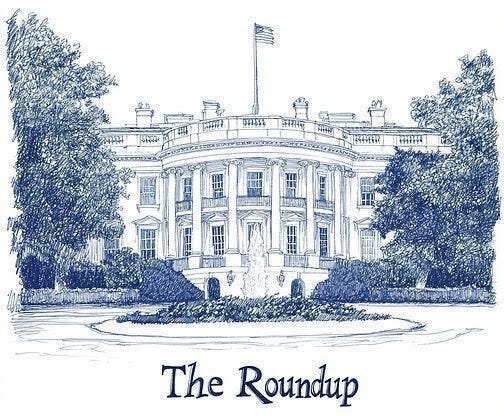Please click here to opt in to receive the Executive Functions Roundup via email and to subscribe to Executive Functions.
Judge Robert W. Gettleman (N.D. Ill.) issued a temporary restraining order requiring ICE to “address the serious conditions demonstrated” at its Broadview, Illinois detention center, including deficiencies in sanitation, food, water, and medical access. (Order.) (NYT.)
A federal magistrate judge in the Eastern District of Virginia on Wednesday ordered the Justice Department to turn over all grand jury materials and evidence seized from Columbia Law professor Daniel Richman, who has served as an adviser to Comey. (NYT.)
Following oral argument at the Supreme Court yesterday, numerous news outlets reported that a majority of justices had expressed skepticism that President Trump has unilateral authority to impose sweeping tariffs without congressional approval under the International Economic Emergency Powers Act of 1977. (NYT.) (WaPo.) (WSJ.) Jack Goldsmith discussed the arguments with John Guida, noting that key justices posed hard questions to each side, and it still wasn’t clear where they would land—though the major questions doctrine could play a critical role in their decision. (NYT.) Josh Blackman wrote that while the case is close, he believes that ultimately the tariffs will be upheld. (Volokh Conspiracy.)
The Senate will vote today on a war powers resolution that would prevent the U.S. military “from hostilities within or against Venezuela that have not been authorized by Congress.” (Joint Resolution.) Secretary of State Marco Rubio and Defense Secretary Pete Hegseth on Wednesday briefed Congress on the military campaign against alleged drug traffickers in the Caribbean and Pacific, prompting Democratic lawmakers to voice concern over what they called a lack of clear answers on the offensive and its policy objectives. (NYT.)
According to the Wall Street Journal, President Trump has expressed reservations about launching military action to topple Venezuelan President Maduro, and his administration remains undecided on its ultimate strategy in Venezuela. (WSJ.)
Bill Shipley argued that the Ninth Circuit’s en banc maneuver in the Oregon National Guard case aimed to bolster Judge Immergut’s injunction against Trump’s deployment order, and that the Supreme Court’s focus on the meaning of “regular forces” in 10 U.S.C. §12406(3) could determine the scope of presidential authority to federalize state troops. (Shipwreckedcrew.)
Pending Interim Order Applications Involving the U.S. Government in the Supreme Court
Blanche v. Perlmutter: The government filed an emergency application on October 27 requesting the Supreme Court to stay a district court interlocutory injunction that temporarily reinstated Shira Perlmutter to her role as Register of Copyrights while litigation over her removal continues. Chief Justice Roberts formally set a deadline of November 10 for a response to the application.
Trump v. Illinois: The government filed an emergency application on October 17 requesting the Supreme Court stay a district court order barring the deployment of the National Guard to Illinois. Justice Barrett formally set a deadline of October 20 for a response to the application. Illinois and the City of Chicago submitted a response on October 20. President Trump filed a reply on October 21. On October 29, Justice Barrett requested supplemental briefs to be filed by November 10.
Trump v. Orr: The government filed an emergency application on September 19 requesting the Supreme Court to stay an injunction issued by a district court that requires the State Department to allow transgender and nonbinary people to choose the sex designation on their passports. Justice Jackson formally set a deadline of October 4 for a response to the application. Orr submitted a response on October 6, and President Trump filed a reply on October 7.




